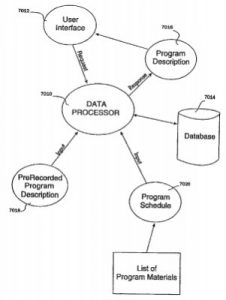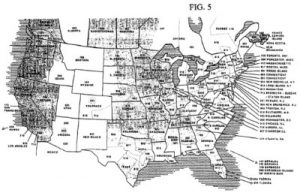 American satellite and online radio provider Sirius XM Holdings (NASDAQ:SIRI) has become a recent target for a company headquartered in Belize which has been bringing patent infringement suits against a growing list of broadcast companies. On Friday, August 12th, Global Interactive Media filed suit against Sirius alleging that the latter’s radio services infringe upon a trio of patents related to broadcast information.
American satellite and online radio provider Sirius XM Holdings (NASDAQ:SIRI) has become a recent target for a company headquartered in Belize which has been bringing patent infringement suits against a growing list of broadcast companies. On Friday, August 12th, Global Interactive Media filed suit against Sirius alleging that the latter’s radio services infringe upon a trio of patents related to broadcast information.
The case is currently in the U.S. District Court for the Southern District of New York (S.D.N.Y.), having been transferred in early August after the lawsuit was originally filed in the U.S. District Court for the Northern District of Illinois (N.D. Ill.). Attorneys using the PACER system for N.D. Ill. should note that the case number, 1:16-cv-06379, has been assigned to a different case in that district, which may cause some confusion if you look at the Docket Number on the complaint as originally filed. In any event, a court memorandum issued in the case on July 19th noted that N.D. Ill. was a questionable choice for Global’s suit as the only thing tying Global to the venue was its choice to use a Chicago-based legal team.
There are three patents-in-suit on which Global Interactive Media alleges infringement. Those include:
 U.S. Patent No. 8032097, titled System to Synchronize and Access Broadcast Information. This protects a system which enables listeners and viewers of a broadcast to access additional information associated with a broadcast, including programming descriptions.
U.S. Patent No. 8032097, titled System to Synchronize and Access Broadcast Information. This protects a system which enables listeners and viewers of a broadcast to access additional information associated with a broadcast, including programming descriptions.- U.S. Patent No. 7574721, titled Apparatus and Method to Generate and Access Broadcast Information. This protects a similar system of providing broadcast information through a database which can be accessed by a user device, allowing a user to search for a particular program of interest in a geographic area.
- U.S. Patent No. 6314577, which has the same title as the ‘721 patent. It protects a computer-implemented information system for presenting broadcast programming information which includes a means for user input to search programming descriptions.
These three patents were originally assigned to a Michael Pocock of London, Ontario. The trio was later assigned to Global Interactive Media in December 2014. According to a search of the Patent Trial and Appeal Board, none of these patents have yet to face inter partes review or other proceedings at PTAB.
At issue in the lawsuit is a service which Global Interactive Media refers to as Sirius’ Program Scheduler. Global is charging that the system, which allows Sirius radio listeners to access information describing broadcasts that are currently playing, infringes upon claims in each of the patents. Global also notes that the ‘721 patent is infringed as Sirius practices a method of identifying satellite radio broadcasts in response to a geographic identifier and a user input for broadcast genre, like salsa or rock.
Sirius is not the only U.S.-based content provider against which Global Interactive Media has sought damages for patent infringement. Global has also alleged infringement of the patents-in-suit against Entercom Communications (NYSE:ETM) of Bala Cynwyd, PA; Comcast Corporation (NASDAQ:CMCSA) of Philadelphia, PA; Yahoo! Inc. (NASDAQ:YHOO) of Sunnyvale, CA; and Home Box Office,  a subsidiary of New York City-based Time Warner Inc. (NYSE:TWX). Media reports indicate that Global has been able to reach settlements with A&E Television Networks, 21st Century Fox (NASDAQ:FOXA) subsidiary FX Networks and the music identification service Shazam. Legal news service Law360 reports that the ‘907 and the ‘577 patents have been involved in 17 patent infringement cases while the ‘721 patent has been involved in 11 cases.
a subsidiary of New York City-based Time Warner Inc. (NYSE:TWX). Media reports indicate that Global has been able to reach settlements with A&E Television Networks, 21st Century Fox (NASDAQ:FOXA) subsidiary FX Networks and the music identification service Shazam. Legal news service Law360 reports that the ‘907 and the ‘577 patents have been involved in 17 patent infringement cases while the ‘721 patent has been involved in 11 cases.
One interesting aspect of this case is that Global Interactive Media is attempting to enforce its rights on a patent which has expired. The ‘907 patent originally issued in October 2011, lapsed effective last October because of a failure to pay maintenance fees. Despite the expiration of the patent, Global is able to bring suit because of the six year statute of limitations on patent infringement actions. Because the patent was issued on October 4th, 2011, Global must use that as a starting date for any damage reward for patent infringement and doesn’t benefit from the full six year statute. As well, because the patent expired on October 4th, 2015, Global cannot seek damages for infringement occurring after that date. So Global can only reap at most four years worth of damages for infringement of this patent. If Global’s failure to pay maintenance fees was unintentional, then it is possible that the abandoned patent could be revived, but there would be intervening rights for anyone who has practiced the technology outlined in the ‘907 patent after it entered the public domain.

![[IPWatchdog Logo]](https://ipwatchdog.com/wp-content/themes/IPWatchdog%20-%202023/assets/images/temp/logo-small@2x.png)


![[Advertisement]](https://ipwatchdog.com/wp-content/uploads/2024/04/Patent-Litigation-Masters-2024-sidebar-early-bird-ends-Apr-21-last-chance-700x500-1.jpg)

![[Advertisement]](https://ipwatchdog.com/wp-content/uploads/2021/12/WEBINAR-336-x-280-px.png)
![[Advertisement]](https://ipwatchdog.com/wp-content/uploads/2021/12/2021-Patent-Practice-on-Demand-recorded-Feb-2021-336-x-280.jpg)
![[Advertisement]](https://ipwatchdog.com/wp-content/uploads/2021/12/Ad-4-The-Invent-Patent-System™.png)







Join the Discussion
One comment so far.
Steve
August 29, 2016 02:55 pmhttp://www.google.com/patents/US8032907 (Corrected reference to first patent)